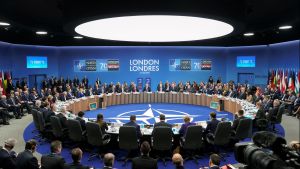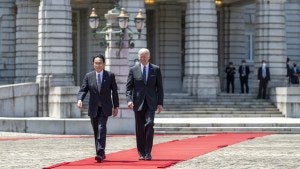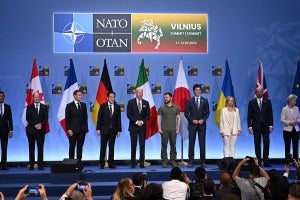As the war in Ukraine continues, majorities say the United States should maintain or increase its commitment to NATO.
In recent years, some Republican leaders on Capitol Hill have drifted away from the US commitment to the NATO alliance, a remarkable shift influenced by the “America-First” policies of former President Donald Trump. A September 7–8 Chicago Council Survey finds that Republicans are more likely to question the benefits of the US-European alliance system now than in recent years, while their support for NATO and for US alliances in East Asia and the Middle East holds steady. At the same time, however, support defending allied countries has a partisan tinge that did not exist in previous surveys.
Key Findings
- Half of Republicans (50%) believe the United States primarily benefits or both the United States and European countries benefit most from the transatlantic alliances in Europe. By comparison, majorities of Democrats (80%) and Independents (63%) view America’s European alliances as either beneficial for the United States or benefitting both Europe and the United States.
- Majorities across the political spectrum say the United States should maintain or increase its commitment to NATO (92% of Democrats, 68% of Republicans, and 73% of Independents.)
- Seven in 10 Democrats (70%), six in 10 Republicans (59%), and a narrow majority of Independents (54%) think US alliances with East Asian countries are beneficial to the United States or to both the United States and allies.
- Two-thirds of Democrats (64%) and about half of Republicans (48%) and Independents (50%) view US alliances with Middle Eastern countries as beneficial to the United States or both the United States and its regional allies.
- Support for sending US troops to help allies defend themselves if they are invaded has dropped since last year, and partisan divisions have grown.
Overall Majorities Consider the US Alliance System to Be Mutually Beneficial
Majorities of Americans consider US alliances with European countries (64%), East Asian partners (60%), and countries in the Middle East (54%) to mostly benefit either the United States or to benefit both the United States and its allies. Overall attitudes toward these alliances remain fairly similar to past surveys going back to 2017. But there are some differences in longitudinal patterns of partisan support.
Alliances with Europe
Self-described Democrats are most convinced that US security alliances in Europe are beneficial (80%) to European allies and/or the United States, up slightly from 2017 when three in four (75%) agreed. Two-thirds of Independents (63%) also view America’s European alliances as beneficial, an increase from the 56 percent who said the same in 2017. By contrast, half of Republicans (50%) believe the United States benefits from its European alliances, down from a high of 61 percent in 2019.
Republican support for the alliance with Europe may have dampened because of concerns about the financial and material costs of continued US assistance to Ukraine. A recent Washington Post-ABC News survey found 58 percent of Republicans and Republican-leaning Independents say they believe the United States is doing too much to help Ukraine, compared to 22 percent of Democrats and Democratic-leaning Independents. The September Chicago Council Survey shows nearly half of Republicans believe that European countries should be most responsible for helping Ukraine defend itself against Russia (46%), compared to just 15 percent of Democrats.
At the same time, however, US public support for NATO seems to remain solid. About eight in 10 Americans (78%) also say that the United States should maintain or increase its commitment to NATO, consistent with high percentages of support in recent years. Democrats are at an all-time high of 92 percent on this question, but solid majorities of Republicans (68%) and Independents (73%) also continue to agree. During the Cold War, Republicans were the most committed to NATO (see figure below). But since 1998, Democrats’ support for the US commitment to the alliance has exceeded that of GOP supporters.
Alliances with East Asia
Republicans have grown more supportive of alliances with East Asian countries (59%, up from 50% in 2020), while Independents (54%) are just slightly less likely now to say that these alliances are beneficial to East Asian allies and/or the United States alone (55%, down from 60% in 2020). Democrats have also become slightly more favorably inclined towards America’s East Asia alliances: seven in 10 (70%) say these alliances benefit both the United States and allies or mostly benefit the United States, up from 64 percent in 2019.
In addition, solid majorities of Americans say that the US security relationships with Japan (77%), South Korea (71%), and Taiwan (65%) do more to strengthen US national security than to weaken it.
Alliances with Middle Eastern Countries
There has been a bit more fluctuation in perceptions of US alliances in the Middle East. Overall, a narrow majority of Americans say that these alliances are beneficial to either the United States or the United States and its allies (54%), down from 2019 (59%) and 2020 (61%). Republican support has dropped significantly from 2020 (48% down from 60%) as has support among Independents (50% vs. 63%). By contrast, 64 percent of Democrats perceive benefits for the United States, an all-time high.
Whether Americans see US alliances in the Middle East as strengthening or weakening US national security varies based on the particular alliance. Two-thirds (64%) say that the US security relationship with Israel does more to strengthen than weaken US national security, including 76 percent of Republicans, 60 percent of Independents, and 58 percent of Democrats. On the other hand, fewer than half (45%) say that the US security relationship with Saudi Arabia does more to strengthen US national security (49% Democrats, 45% Republicans, 43% Independents).
Defending Allies
Overall majorities continue to support using US troops if Russia invades a NATO ally like Latvia, Lithuania, Estonia (57%, compared to 56% in 2022), or Germany (64%, new question in this survey). Fewer now than a year ago are prepared to commit US troops to defend South Korea in the event of invasion by the North (50% favor, down from 63% in 2022). And a majority oppose using US troops if China initiates a military conflict with Japan over disputed islands (55%, 43% favor).
The recent survey highlights some growing partisan divisions on the use of force to protect allies. For example, about two-thirds of Democrats (68%) support using US troops to help defend one of the Baltic NATO members, compared to 55 percent of Independents and 48 percent of Republicans. If North Korea invaded South Korea, 57 percent of Democrats support using US troops to defend Seoul, compared to 48 percent of Independents and 46 percent of Republicans.
The 2023 Chicago Council Survey, a project of the Lester Crown Center on US Foreign Policy, is the latest effort in a series of wide-ranging surveys on American attitudes toward US foreign policy. The 2023 Chicago Council Survey is made possible by the generous support of the Crown family and the Korea Foundation.
The survey was conducted between September 7, 2023 and September 18, 2023, among a representative national sample of 3,242 adults aged 18 or older living in all 50 US states and the District of Columbia. The margin of sampling error for the full sample is ±2.0 percentage points, including a design effect of 1.2908. The margin of error is higher for partisan subgroups or for partial-sample items. Partisan identification is based on how respondents answered a standard partisan self-identification question: “Generally speaking, do you think of yourself as a Republican, a Democrat, an Independent, or what?”
The survey was conducted in English and Spanish by Ipsos Public Affairs, a polling, social science, and market research firm in Palo Alto, California, using a randomly selected sample of Ipsos’s large-scale nationwide research panel, KnowledgePanel® (KP). KP is the first and largest online research panel that is representative of the entire US population. Ipsos recruits panel members using address-based sampling (ABS) methods to ensure full coverage of all households in the nation.
The survey was fielded to a total of 5,838 panel members, yielding a total of 3,399 completed surveys (a completion rate of 58.2 percent). The median completion time for the survey was 25 minutes. Of the 3,399 total completed surveys, 157 cases were excluded for quality control reasons, leaving a final sample size of 3,242 respondents.


Related Content
 Defense and Security
Defense and Security
Mira Rapp-Hooper joins Ivo Daalder on Deep Dish for a discussion about the state of US alliances at a moment when new concerns are flaring up.
 Public Opinion
Public Opinion
The Biden administration emphasizes strengthening ties with America's global allies and partners. Which countries do Americans view as their allies—and adversaries?
 Public Opinion
Public Opinion
And bipartisan majorities of Americans support admitting new members to the alliance, Council polling shows.
 Public Opinion
Public Opinion
Survey results reveal how Japanese perceptions of security in East Asia have changed following Russia's invasion of Ukraine.


